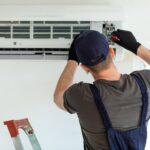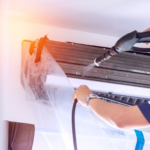If you’ve ever noticed beads of water collecting around an air conditioner system or pipes, or seen water slowly dripping from your AC unit then you’ve likely experienced the dreaded ‘air conditioner sweat’. While a small amount of condensation on an ac system is normal, dozens of droplets or water drips certainly is not – and can often indicate a bigger problem with your system. If you’ve noticed some droplets on your unit and are curious as to whether this is normal or problematic – read on to learn more.
What is air con sweat?
Air conditioner sweat is condensation that occurs when warm, moist air comes into contact with the cold surface of an AC duct. Air conditioner sweat happens when the air temperature is below the dew point temperature. The dew point temperature is the temperature at which water vapour will start to form.
The excess moisture – or air conditioner sweat – created can also lead to damage to your walls, termites and mould.
When should I worry about condensation on air conditioning ducts?
Firstly, the question that needs to be asked is why is your air conditioner in contact with warm, moist air when the room should be cooled by the air conditioner?
The answer can be a variety of reasons. Often, air conditioner sweat can be harmless and could be something as simple as a window left cracked open, letting in outside air. But, sometimes air conditioner swear can be a symptom of something more serious issue in your HVAC system.
To help you identify what’s causing your air conditioner to sweat and to figure out how to rectify the problem, read through the points below.
Reasons why your air conditioning system may be sweating.
Humid Air
Though you may not be aware of them, if your air conditioner duct is sweating there may be a chance that there is a small space or cracks in the room where outside air can creep in. This is especially true if you live in a humid area.
If you’re experiencing AC sweat, then a good place to start is by checking for small gaps where outside air can enter. When the hot, humid air mixes with the cold air of the AC unit, condensation forms.
If the condensation is caused by outside air getting in, then the fix is relatively simple – obstruct the outside air from entering. If you’re unable to seal up the gaps you can try placing a fan in the room, this will circulate air flow around to keep it cooler.
Low Temperature Setting
To understand how temperature can affect condensation, you must first understand what relative humidity is. Put simply, relative humidity is a figure that says how much water vapor is in the air, compared to how much it could hold at that temperature. You’ve probably seen this on a weather channel when the percentage of humidity in the forecast is shown.
For each relative humidity percentage, there is a value below that figure where condensation will start. So, if you live in a humid area and set your ducted air conditioner unit to a low degree, it’s likely to form condensation – or AC sweat. This type of AC sweat isn’t a problem but can cause damage to walls when it drips.
Restricted Air flow
There are a number of ways in which air flow can be restricted, these include a blocked duct, a backed-up condensation line, dirty filters or frozen evaporator coils. When airflow is reduced, the temperature of the air goes below the dew point and causes sweating.
In this case, the AC sweating is a symptom of another problem with your unit. It’s best to get an air conditioning technician in to find exactly what is wrong with the system so that it can be fixed and your AC can be restored to its full potential.
Insulation
When an aircon duct is installed without the correct amount of insulation, it can be the cause of the air conditioning sweat. Insulation can help to prevent sweating because it reduces the temperature of the vents and ducts.
Without insulation, the vents and ducts can become very cold when the AC unit is running and will cause the surrounding air to collect in the ducts and cause condensation.
Alternatively, too much roof insulation can cause a room to become too warm, which can also cause sweating.
A good technician will be able to advise you about how thick the insulation should be for the area you’d like to install a duct.
Plugged Drain Line
A plugged drain line can have a devastating effect on a house and in extreme cases, even cause the roof to cave in.
Air conditioners have a drip tray that catches condensation from the humid outside air and drains the water droplets down through condensation lines and out of your room. A drain line can become plugged for a variety of reasons, like getting debris, dust, hair or grime caught in the line, which can block the water from draining out.
When this happens water can build up in the ceiling. In minor cases, homeowners will just experience a small drip. However, if your ceiling is dripping near an aircon vent it’s important to take this as a warning sign and call an HVAC technician. If too much water builds up, then the weight and pressure can cause the ceiling to collapse.
Conclusion
While we’ve touched on some common possible causes for AC sweat, there are many more problems that can be the reasons for condensation in your ducted air conditioner. While some condensation can be harmless and is to be expected, sometimes it can indicate an imminent problem.
Much like when a unit is blowing out hot air or frozen over, sweat on an air conditioner unit can be a symptom of something bigger. If your unit is dripping water out of it, then the sooner you call a technician to come and check it out, you’ll likely save a lot of money. If you wait too long the problem may get bigger and end up costing a lot more in the long run.
FAQs
Is it normal for an air conditioner to sweat?
Mild condensation on an AC unit shouldn’t be too much of a cause for concern. In fact, a small amount of condensation on a running air conditioner is completely normal.
However, if the sweating is very obvious then it could well be a sign that there’s a problem with your system. So, to be safe, if you notice any condensation on your unit, it’s a good idea to get it checked out by a professional.
How much water condensation from AC is normal?
As outlined in the information above, in a healthy air conditioning unit, the amount of condensation can directly be correlated to the humidity of your environment. If the air is more humid, more condensation can be expected.
Even in a non-humid environment, small beads of sweat on your air conditioner are normal. But, if your AC unit is dripping any water down walls and/or onto the floor, then this is a sign of a problem and can signify that it’s time to call a professional.
Learn more about common issues people have with air conditioners
If your air conditioner is no longer keeping you cool and comfortable, there’s likely an underlying issue that needs attention. From frozen evaporator coils to thermostat malfunctions, we’ve seen all kinds of AC failures. Here are the most common problems that cause air conditioning systems to stop working properly.
- Air conditioner unit is frozen or icing up
- Air conditioner unit is leaking water
- Air conditioner heat mode is not working
- Air conditioner isn’t turning on
- Air conditioner is making loud buzzing noises
- Ducted air conditioner isn’t working in all rooms
- Air conditioner smells
- Air conditioner is sweating inside
- Air conditioner is blowing hot air
- Air conditioner keeps turning off
What are most air conditioner breakdowns caused by?
An air conditioner that’s struggling to cool or has stopped working completely often has a simple explanation. Some of the most frequent causes of AC breakdowns include clogged filters, electrical malfunctions, and refrigerant issues. Here are the most common culprits.
- AC breakdown caused by electrical problems
- PCB faults
- Faulty air conditioner compressor that needs replacing
- Faulty air conditioner capacitor that needs replacing
- Faulty air conditioner condenser that needs replacing
- Faulty air conditioner evaporator coil that needs replacing
- Air conditioner pipe insulation that needs replacing
There are many more reasons your air conditioner may not be working, and our first step with any repair job is to diagnose the issue with an initial inspection.
Get a free quote on air conditioning repairs in Brisbane
A faulty air conditioner can turn even the most comfortable home into an unbearable space. If yours isn’t working properly, our team provides professional air conditioning repairs in Brisbane, starting with a free quote.

